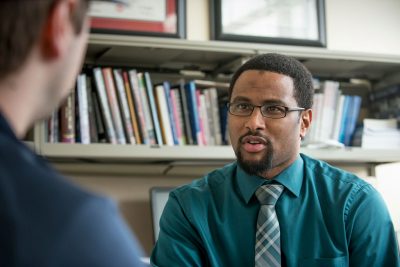
Editor’s Note: The following was originally published on the UConn Innovation Portal and then again on the Neag School of Education’s website.
Joseph Cooper, an assistant professor of sport management and educational leadership in UConn’s Neag School of Education, is a co-investigator with Drew Brown, assistant Africana studies professor at the University of Delaware, on a grant from the American Athletic Conference to study the topic of whether and how white coaches are fulfilling the cultural needs of black college athletes.
Nine out of the 12 universities in the American Athletic Conference (AAC) have white football coaches, but many of the athletes on these teams are black, and the quality of the relationship between black college athletes and white coaches often impacts athletes’ developmental experiences in college and post-college, according to the researchers.
The quality of the relationship between black college athletes and white coaches often impacts athletes’ developmental experiences in college and post-college, according to the researchers.
Cooper and Brown will conduct interviews and administer surveys to college athletes from three different AAC schools to better understand if black college athletes feel their relationship with their white coaches fulfill their cultural needs.
The study will apply co-cultural communication theory, which studies how nondominant groups in society create alternative forms of communication to articulate their experiences. In addition, this study will incorporate critical race theory, which scrutinizes existing societal power structures that marginalize people of color and is germane to the study of the dynamic between white coaches and black college athletes. Thus, this study will explore the role race, culture, and communication styles play in the relationship between “in group” and “out group” members across the lines of race and sport role involvement.
After completing this study, Cooper and Brown will generate suggestions for the direction of future research in this area to improve these critical relationships.
Cooper received his Ph.D. in kinesiology and sport management and policy from the University of Georgia. His areas of interest are sport management, gender and race in sports, racism and other forms of oppression, higher education and qualitative research.
Access the original post on the UConn Innovation portal.